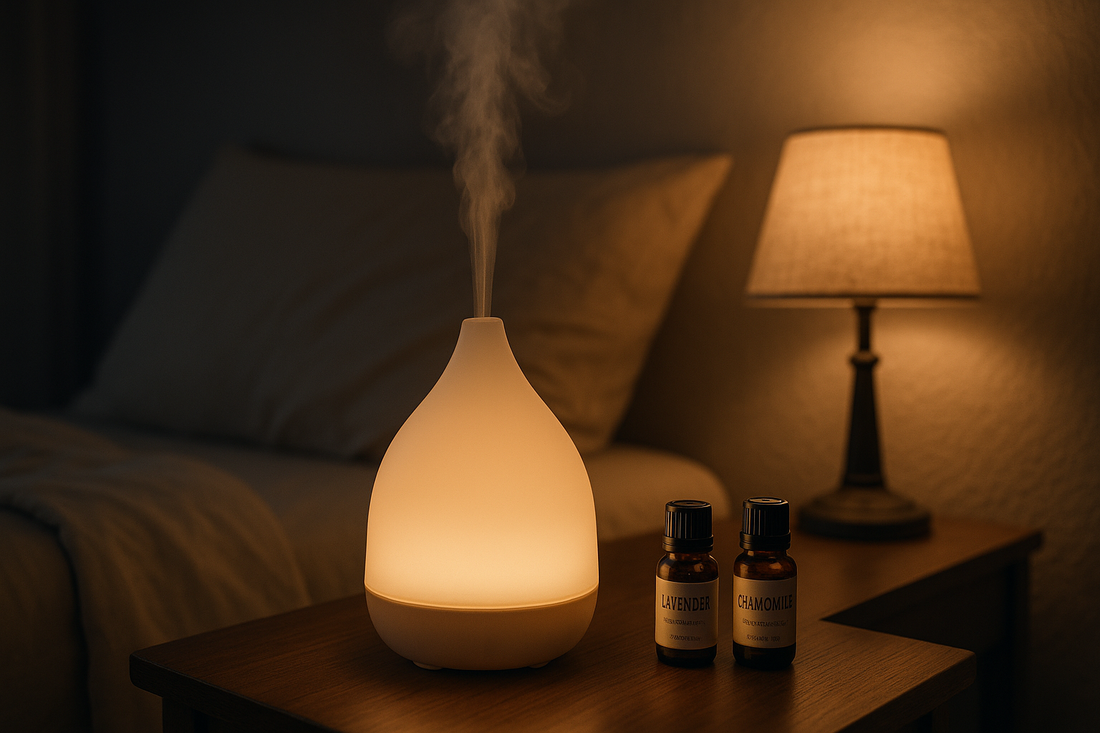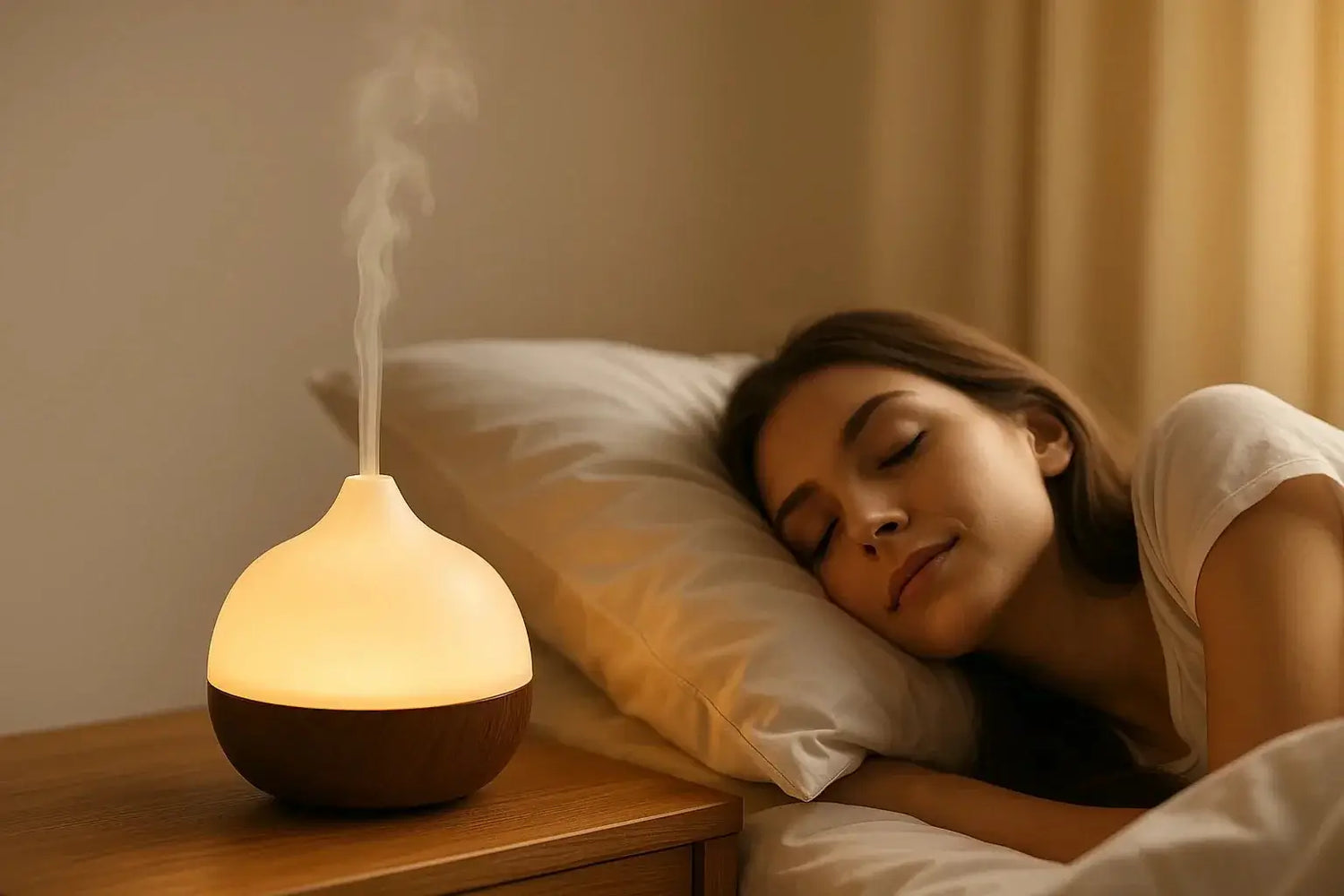
Sleeping With Essential Oil Diffuser: Complete Safety Guide & Best Practices 2025
Share
Quick Answer: Yes, sleeping with a diffuser is safe when you follow proper guidelines: use high-quality essential oils, run it for 30-60 minutes (not all night), maintain proper ventilation, and clean it regularly. Modern diffusers with auto-shutoff features like the QuietAura Sleep Diffuser are specifically designed for safe overnight use.
Is It Safe to Sleep With a Diffuser On?
The short answer is yes—but with important safety considerations. While many sources recommend turning your diffuser off before sleep, modern diffusers with built-in safety features can run safely throughout the night when used correctly.
The key is understanding how to use your diffuser safely, which oils to choose, and what precautions to take.
Are Diffusers Bad for Your Lungs?
This is one of the most common concerns, and here's what the research shows:
Good news: When used properly with pure, high-quality essential oils, diffusers are NOT bad for your lungs. In fact, certain essential oils like eucalyptus and peppermint can actually support respiratory health.
However, there are risks if you:
- Use synthetic fragrance oils (not pure essential oils)
- Over-diffuse in poorly ventilated spaces
- Use oils you're allergic or sensitive to
- Never clean your diffuser (bacteria buildup)
Safety tip: Always use 100% pure essential oils and ensure your bedroom has adequate ventilation. The QuietAura Sleep Diffuser uses ultrasonic technology that creates a fine, breathable mist—much gentler on lungs than traditional steam diffusers.
Can You Leave a Diffuser On All Night?
This depends on your diffuser type and personal sensitivity:
✅ Safe for All Night (With Auto-Shutoff)
Modern diffusers with automatic shutoff timers are designed for overnight use. They typically run for 1-4 hours before automatically turning off, which is ideal for sleep.
The QuietAura Sleep Diffuser features:
- Auto-shutoff when water runs out
- Programmable timer settings (1hr, 3hr, 6hr)
- Whisper-quiet operation (under 30dB)
- Large 300ml capacity for extended use
⚠️ Not Recommended All Night
Older diffusers without auto-shutoff or those that continuously run can:
- Over-saturate your room with essential oils
- Cause headaches or respiratory irritation
- Pose fire hazards if they overheat
- Waste essential oils unnecessarily
Expert recommendation: Run your diffuser for 30-60 minutes before bed, or use one with a 1-3 hour timer that shuts off automatically after you fall asleep.
Best Essential Oils for Sleeping With a Diffuser
Not all essential oils are created equal for sleep. Here are the scientifically-backed best options:
1. Lavender (The Gold Standard)
Lavender is the most researched essential oil for sleep. Studies show it:
- Reduces anxiety and promotes relaxation
- Increases deep sleep duration
- Lowers heart rate and blood pressure
- Works for adults, children, and even pets
2. Chamomile (Gentle & Calming)
Roman chamomile is perfect for sensitive individuals and children. It's known for:
- Mild sedative properties
- Reducing nighttime anxiety
- Soothing digestive discomfort that disrupts sleep
3. Cedarwood (Grounding & Deep)
Cedarwood essential oil promotes:
- Increased melatonin production
- Deeper, more restorative sleep
- Reduced restlessness and tossing
4. Bergamot (Anxiety Relief)
Unlike most citrus oils (which are energizing), bergamot is calming and:
- Reduces cortisol (stress hormone)
- Improves mood before bed
- Helps racing thoughts settle
5. Ylang Ylang (Sedative Properties)
This floral oil is powerful for:
- Lowering blood pressure
- Slowing heart rate
- Creating a sense of peace and calm
Pro tip: Create a custom sleep blend by mixing 3 drops lavender + 2 drops cedarwood + 1 drop chamomile in your diffuser.
Complete Safety Guidelines for Sleeping With a Diffuser
1. Choose the Right Diffuser
Not all diffusers are safe for overnight use. Look for:
- ✅ Ultrasonic diffusers (cool mist, no heat)
- ✅ Auto-shutoff feature
- ✅ BPA-free materials
- ✅ Quiet operation (under 35dB)
- ✅ Adequate water capacity (200ml+)
The Flame Effect Aroma Diffuser and Sleep Diffuser both meet these safety standards.
2. Proper Placement
Where you place your diffuser matters:
- Distance: Keep 3-6 feet away from your bed
- Height: Place on a nightstand or elevated surface
- Stability: Ensure it's on a flat, stable surface
- Away from: Electronics, fabrics, and direct airflow
3. Dilution and Duration
More is NOT better with essential oils:
- Water ratio: 3-5 drops per 100ml of water
- Duration: 30-60 minutes for beginners
- Frequency: Start with 3-4 nights per week
- Breaks: Take 1-2 nights off weekly to prevent sensitization
4. Ventilation is Critical
Even with safe diffusers, you need proper airflow:
- Crack a window slightly (even in winter)
- Don't diffuse in tiny, sealed rooms
- Ensure your bedroom door isn't completely sealed
- Use a fan for air circulation if needed
5. Regular Cleaning Protocol
Dirty diffusers can harbor bacteria and mold:
- After each use: Empty remaining water
- Weekly: Clean with white vinegar solution
- Monthly: Deep clean with rubbing alcohol
- Never: Let water sit for days between uses
Who Should NOT Sleep With a Diffuser?
While generally safe, certain people should avoid or use extreme caution:
❌ Pregnant Women
Some essential oils can trigger contractions or affect fetal development. Consult your doctor first. Generally safe options: lavender, chamomile (in small amounts).
❌ Infants Under 3 Months
Babies' respiratory systems are too delicate for essential oils. Wait until at least 3-6 months, and always consult a pediatrician.
❌ People with Asthma or COPD
Essential oils can trigger respiratory symptoms in some people with lung conditions. Start with very diluted amounts and monitor closely.
❌ Pets in the Room
Cats, dogs, and birds can be sensitive to certain essential oils. Never diffuse tea tree, eucalyptus, or citrus oils around pets. If your pet sleeps in your room, use pet-safe oils only (lavender, chamomile in small amounts).
⚠️ People with Allergies
If you have fragrance sensitivities, start with single oils (not blends) and very short diffusion times (10-15 minutes).
Common Mistakes to Avoid
1. Using Synthetic Fragrance Oils
These are NOT the same as essential oils and can release harmful chemicals. Always use 100% pure, therapeutic-grade essential oils.
2. Over-Diffusing
More doesn't equal better sleep. Too much can cause:
- Headaches
- Nausea
- Respiratory irritation
- Olfactory fatigue (nose blindness)
3. Never Cleaning Your Diffuser
This is a health hazard. Bacteria, mold, and oil residue build up quickly.
4. Diffusing in a Sealed Room
Without ventilation, essential oil concentration becomes too high.
5. Using the Wrong Oils
Energizing oils like peppermint, rosemary, or citrus will keep you AWAKE, not help you sleep.
The Perfect Sleep Diffuser Routine
Here's my exact routine that transformed my sleep quality:
1 Hour Before Bed:
- Fill your diffuser with filtered water
- Add 4-5 drops of lavender essential oil
- Set timer for 60 minutes
- Place 4-6 feet from your bed
30 Minutes Before Bed:
- Turn on your humidifier (if air is dry)
- Dim lights or use an amber reading light
- Begin your wind-down routine (reading, stretching, meditation)
At Bedtime:
- Put on your 3D blackout sleep mask
- Let the diffuser auto-shutoff (or manually turn off)
- Enjoy deep, restorative sleep
Diffuser vs Humidifier: Can You Use Both?
Yes! In fact, using both can create the ultimate sleep environment:
- Diffuser: Provides aromatherapy benefits (relaxation, stress relief)
- Humidifier: Maintains optimal humidity (40-60%) for breathing and skin
Place them 3-4 feet apart for best results. The QuietAura 3L Ultrasonic Humidifier pairs perfectly with the Sleep Diffuser for complete bedroom optimization.
For smaller spaces or travel, the USB Mini Humidifier is a great compact option.
Additional Sleep Optimization Tools
While your diffuser creates the perfect aromatherapy environment, these complementary tools can further enhance your sleep:
- Galaxy Projector Night Light: Creates a calming visual atmosphere
- Mini Dehumidifier: Controls excess moisture in humid climates
- Waterless Nebulizer Diffuser: For pure, undiluted essential oil aromatherapy
Frequently Asked Questions
How long should I run my diffuser before bed?
30-60 minutes is ideal. This gives your room time to fill with the calming scent without over-saturating the air.
Can I use tap water in my diffuser?
Filtered or distilled water is best to prevent mineral buildup, but tap water works in a pinch. Just clean your diffuser more frequently.
What if I wake up with a headache?
You're likely over-diffusing. Reduce the number of drops (try 2-3 instead of 5-6) and shorten the duration to 30 minutes.
Is it safe to diffuse around my baby?
Wait until your baby is at least 3-6 months old. Use only gentle oils like lavender or chamomile, heavily diluted (1-2 drops), and only for 15-20 minutes in a well-ventilated room.
Can essential oils help with snoring?
Yes! Eucalyptus, peppermint, and thyme can help open airways. However, these are stimulating, so use them 1-2 hours before bed, not right at bedtime.
Do I need an expensive diffuser?
Not necessarily, but invest in one with auto-shutoff and ultrasonic technology. The QuietAura Sleep Diffuser offers premium features at an affordable price point.
The Science Behind Aromatherapy and Sleep
Why does sleeping with a diffuser actually work? Here's the science:
Olfactory System Connection: When you inhale essential oils, molecules travel through your nose to the olfactory bulb, which connects directly to the limbic system—the part of your brain that controls emotions, memories, and sleep-wake cycles.
Neurotransmitter Release: Certain essential oils trigger the release of neurotransmitters like serotonin and GABA, which promote relaxation and sleep.
Cortisol Reduction: Studies show that lavender and bergamot essential oils significantly reduce cortisol (stress hormone) levels, making it easier to fall asleep.
Heart Rate Variability: Aromatherapy has been shown to improve heart rate variability, a marker of relaxation and parasympathetic nervous system activation.
Final Verdict: Is Sleeping With a Diffuser Safe?
Yes, sleeping with a diffuser is safe when you:
- ✅ Use a modern diffuser with auto-shutoff
- ✅ Choose 100% pure essential oils
- ✅ Maintain proper ventilation
- ✅ Follow recommended dilution ratios
- ✅ Clean your diffuser regularly
- ✅ Place it at a safe distance from your bed
- ✅ Start with short durations and build up
The key is using quality equipment and following safety guidelines. The QuietAura Sleep Diffuser is specifically designed with these safety features in mind—auto-shutoff, ultrasonic cool mist technology, whisper-quiet operation, and BPA-free materials.
Ready to Transform Your Sleep?
Thousands of people have discovered the sleep-transforming power of aromatherapy diffusers. With the right diffuser, quality essential oils, and proper usage, you can create a bedroom sanctuary that promotes deep, restorative sleep night after night.
Shop with confidence: All QuietAura sleep devices are backed by secure PayPal checkout with comprehensive buyer protection. PayPal's trusted payment system ensures your purchase is protected, and their hassle-free return policy means you can try our diffusers completely risk-free. Experience the peace of mind that comes with PayPal's secure checkout process.
Start with the QuietAura Sleep Diffuser, add your favorite calming essential oils, and experience the difference that proper aromatherapy can make in your sleep quality.
Sweet dreams await. 🌙✨

